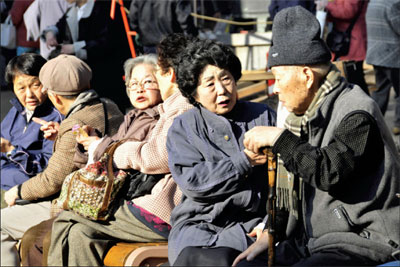|
Asia's growing elderly population:
'Innovative ways, a sine qua non to sustain growth'
As Asia is on track to become the oldest region in the world, the ADB
is helping countries prepare for this vast demographic shift.
Asia’s elderly population is projected to reach 922.7 million by the
middle of this century. As a result, Asia is on track in the next few
decades to become the oldest region in the world. The policies and
systems of governments in Asia are hardly prepared for this vast
demographic shift.
|

Asia’s elderly population is projected to reach 922.7 million by
the middle of this century. As a result, Asia is on track to
become the oldest
region in the world, within the next few decades. |
“As the population dividend that fuelled Asia’s labour-intensive
growth becomes a tax, the region must find more innovative ways to
sustain its economic expansion and to provide more comprehensive support
for its growing elderly population,” said ADB's Chief Economist,
Changyong Rhee.
ADB has been an active partner in helping Asian countries devise
strategies and policies that will keep the millions of elderly in the
region out of poverty.
The ADB report, Asian Development Outlook 2011 Update found that
rapidly shifting demographics - particularly declining birth rates and
increasing life expectancies - will increasingly shape the economic
direction of developing countries in Asia. The favourable demographics
that have driven high economic growth in the region are likely to
reverse.
“Asia's population is aging at a speed unprecedented in human
history,” said Rhee, at the launch of the report.
“As the population dividend that fuelled Asia’s labour-intensive
growth becomes a tax, the region must find more innovative ways to
sustain its economic expansion, and to provide more comprehensive
support for its growing elderly population,” he said.
The report, Impact of Population Aging on Asia's Future Growth,
examined demographic trends and their impact on economic growth in 12
developing Asian economies that make up the bulk of the region's
population and output.
Asia's looming pension crisis takes a reader-friendly approach to
bring some of the key statistics about the region’s aging population and
pension issues, to light.
The ADB has done a variety of reports that examine the pension
systems in Asia and how best to prepare them for region’s graying
population. The book, Pension Systems in East and Southeast Asia:
Promoting Fairness and Sustainability, examines the twin challenges
facing governments in the region: maintaining growth and providing
adequate, affordable, sustainable income support for the elderly. The
book examines the pension systems of eight developing Asian countries -
the People's Republic of China, Indonesia, the Republic of Korea,
Malaysia, the Philippines, Singapore, Thailand and Vietnam.
In addition, the book Social Protection for Older Persons: Social
Pensions in Asia, examines the issue with case studies from Bangladesh,
Nepal, Thailand, Vietnam, and South Caucasus and Central Asia.
The book, Pension Systems and Old-Age Income Support in East and
Southeast Asia: Overview and Reform Direction sets forth concrete and
specific policy options for reforming Asia’s pension systems. This
includes not only country-specific options but regional solutions as
well, such as the need to extend pension coverage.
On the Asian Development Blog, the Deputy Director General of ADB’s
Strategy and Policy Department, Indu Bhushan raised the question of
whether a raised retirement age is needed to help address the issue,
while Yolanda Fernandez Lommen, discussed how an ageing population is
threatening the future economic growth of the People’s Republic of
China, while “Who should take care of Asia's elderly?” an online poll
that asked that question found that 46 percent of respondents said it
should be their children, while 39 percent indicated that it should be
the government. Of those polled, 15 percent said the elderly should take
care of themselves.
ADB’s work in support of Asia’s elderly fall within the area of
social protection. Between 1996 and 2008, ADB provided $2.3 billion in
loans to help developing member countries increase their social
protection programs and help the most vulnerable members of society. |


